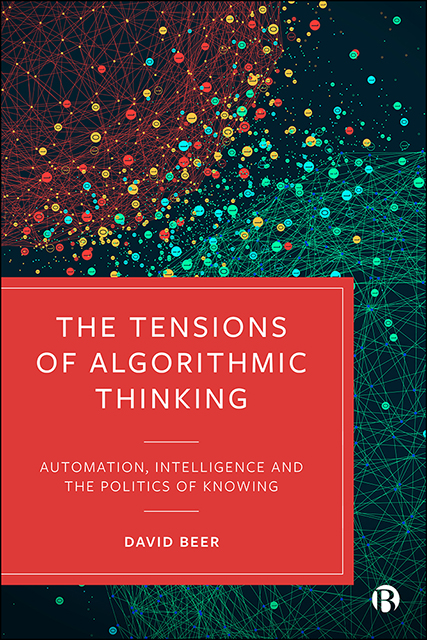Book contents
- Frontmatter
- Dedication
- Contents
- Acknowledgements
- 1 Introduction: Tense Thinking and the Myths of an Algorithmic New Life
- 2 The Pursuit of Posthuman Security
- 3 Overstepping and the Navigation of the Perceived Limits of Algorithmic Thinking
- 4 (Dreaming of) Super Cognizers and the Stretching of the Known
- 5 The Presences of Nonknowledge
- 6 Conclusion: Algorithmic Thinking and the Will to Automate
- References
- Index
5 - The Presences of Nonknowledge
Published online by Cambridge University Press: 21 June 2023
- Frontmatter
- Dedication
- Contents
- Acknowledgements
- 1 Introduction: Tense Thinking and the Myths of an Algorithmic New Life
- 2 The Pursuit of Posthuman Security
- 3 Overstepping and the Navigation of the Perceived Limits of Algorithmic Thinking
- 4 (Dreaming of) Super Cognizers and the Stretching of the Known
- 5 The Presences of Nonknowledge
- 6 Conclusion: Algorithmic Thinking and the Will to Automate
- References
- Index
Summary
Back in 1994, reflecting on the direction of rapidly advancing neural network technologies, the Nobel Prize-winning neural systems expert Leon N. Cooper mused on what the future might yet hold:
I do have a concrete prediction. The twentieth century is the century of computers, telephones, cars, and airplanes. I think the twenty-first century will be the century of what we call intelligent machines – machines that combine the rapid processing power of the current machines with the ability to associate, to reason, to do sensible things. And I think these machines will just evolve. We’ll have simple ones at first, and finally we’re going to have reasoning machines. (Cooper, 1998: 94)
This juxtaposition of eras, as imagined a quarter of a century ago, hints at how the advancing computer science of the time, especially in its use of brain science as a foil, was beginning to see a future in which machines would hold escalating forms of intelligence. Where the past hundred years had been defined by machines, the coming hundred years, Cooper predicted, would be defined by how those machines were to become intelligent. With this, he imagined, would come an automated form of reasoning; an automation of the sensible. An advancing era of knowing was positioned on near the horizon, the new life of evolving machines was perceived to be just around the corner and it would bring with it automated forms of reasoning (see Chapter 1).
Cooper frames this in terms of what he imagined at the time would be a growing ability for computational reason. He also anticipated a relative and growing comfort with these forms of intelligence and what they might be used to achieve. His observation was that:
We’re comfortable with computers that enhance our logic, our memory, and we’ll be comfortable with reasoning machines. We’ll interact with them. I think they will come just in time because of the kinds of problems we have to solve, these very complex problems that are beyond the capacity of our minds, probably will be solved in interaction with such machines. (Cooper, 1998: 94)
- Type
- Chapter
- Information
- The Tensions of Algorithmic ThinkingAutomation, Intelligence and the Politics of Knowing, pp. 96 - 123Publisher: Bristol University PressPrint publication year: 2022

